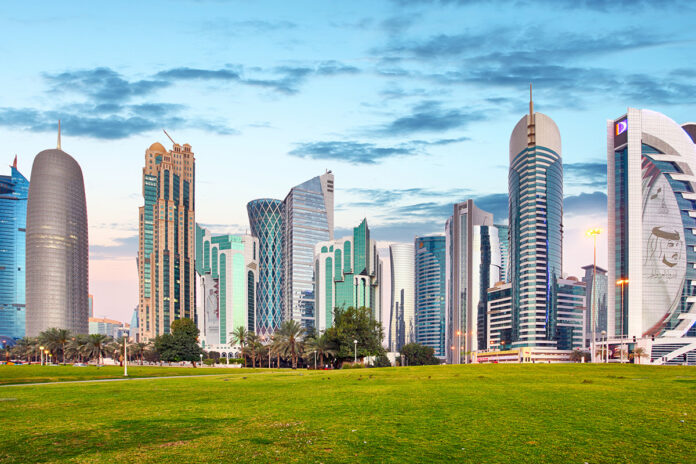Sponsored by Expo 2023 Doha Qatar, the AIPH Green City Briefings 2022/23 are a series of one-hour webinars focussing on cities around the world that demonstrate significant progress in including plants and nature in their city’s form and function. The second session in the series featured Doha, Qatar, where innovative solutions to the threat of desertification are being employed.
Francesco Roesler, LEAD Landscape and Masterplan Designer for Dar London, joined the briefing to explain the development process and masterplan for the upcoming Expo 2023 Doha Qatar. The theme of the Expo is ‘Green Desert, Better Environment’ – it will be the first AIPH-approved Expo in a desert setting.
Qatar has a challenging climate, with high temperatures, lack of rainwater, and limited fertile soil. “These constraints have pushed Qatar to adopt alternative techniques to manage resources,” said Francesco. “These techniques have already reduced water requirements in farming in Qatar by 70 per cent.” The Expo will showcase these innovative solutions, as well as international initiatives combating desertification.
To create a highly sustainable event, the organisers selected Al Bidda Park as the Expo location where native flora and existing structures can be incorporated into the pavilions. Each garden is required to use minimal water and to be suitable for the Qatari climate. Expo 2023 Doha Qatar is open from October 2023 to March 2024, and when the Expo closes the park and its facilities will be given to the local community to enjoy.
In a climate with different challenges, Harry Watkins, Executive Director of St Andrews Botanic Garden in Scotland explained their approach to the use of plants, describing how ecological strategies were applied to the process of redesigning the garden.
“The botanic garden is a place of anticipatory work,” he said, “somewhere which tries to forecast ecological dynamics and evolutionary behaviours.”
By creating three novel ecosystems that replicate habitats in Fife, Scotland, this approach embraces a less rigid form of design, allowing plants to grow and interact naturally. Replicating wood meadows, sand dunes, and a Biocene Garden, they have the opportunity to observe plant dynamics across these three environments, using it to inform future design choices.
“My hope is that it becomes a reference point for people to be able to think about how the ecological drivers of evolution are going to operate over the next 70 years.”
MC Mark Laurence of Mark Laurence Design commented: “The role of horticulture is changing rapidly. It needs to move from the concept of ornaments into a role of ecosystem design and function because it is ecosystems that moderate climate change.”
The next AIPH Green City Briefing will focus on the Grand Winner of the inaugural AIPH World Green City Awards: Hyderabad, India. Their winning initiative, titled ‘Green Garland to the State of Telangana’, also won the ‘Living Green for Economic Recovery and Inclusive Growth’ category. This flagship program was established with the aim of increasing the tree cover of the State of Telangana. Register for the November briefing session to learn how successful they were.
The briefing will take place on the 8th November at 1pm GMT. For more information and to register, visit the AIPH Website.




